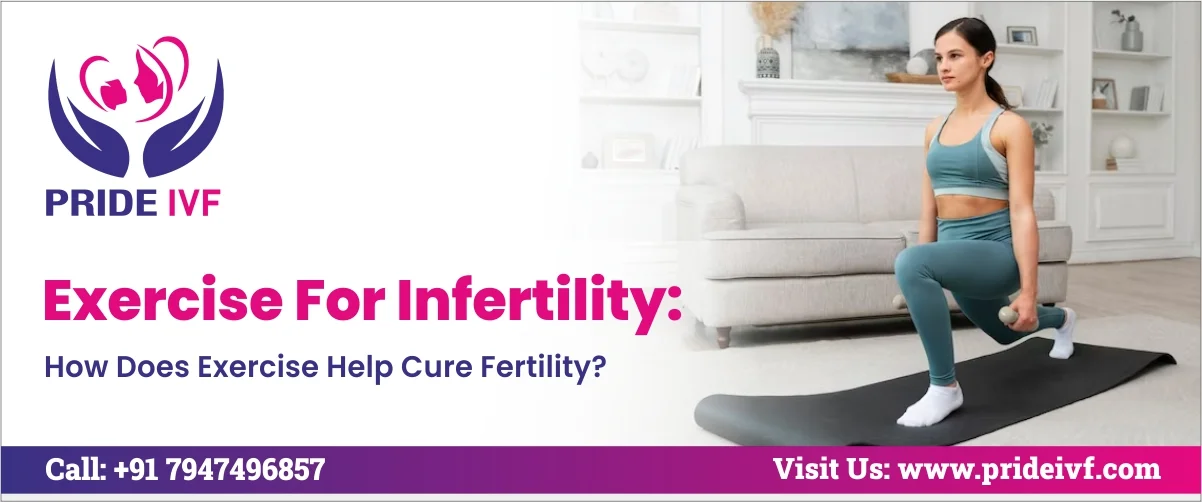Infertility can be a daunting and emotionally taxing journey for many individuals and couples. The desire to start a family is deeply rooted in our human experience, making the struggles of infertility all the more challenging. However, amidst the medical treatments and emotional turmoil, there’s an often-overlooked ally in the battle against infertility – exercise for infertility. Yes, you read that right. Exercise isn’t just about staying fit; it can play a significant role in boosting fertility. Let’s explore how the simple act of moving your body can have profound effects on your journey to parenthood. Consult one of the finest infertility specialist in India with pride IVF.




Exercise and the Mind-Body Connection
Infertility isn’t just a physical challenge; it’s an emotional rollercoaster. The ups and downs, disappointments, and uncertainties can take a toll on your mental health. This is where exercise for infertility steps in as a powerful tool.
Exercise has a remarkable ability to connect mind and body. When you engage in physical activity, your brain releases endorphins, those feel-good chemicals that can elevate your mood and reduce stress. Stress, as many of us are aware, can wreak havoc on fertility. High stress levels can disrupt hormonal balance, interfere with ovulation, and even impact sperm production in men. By incorporating exercise into your routine, you’re essentially giving yourself a natural mood booster and stress reducer.
One of the most significant benefits of exercise for those struggling with infertility is the emotional relief it provides. As you break a sweat and focus on your movements, you’re temporarily escaping the anxiety and heartache that often accompany infertility. You’re granting yourself a mental break, which is just as crucial as the physical benefits of exercise.
Exercise’s Impact on Reproductive Hormones
The world of fertility is deeply intertwined with hormones, and exercise can be a game-changer here as well. Hormones like insulin, cortisol, and thyroid hormones play a pivotal role in fertility. Disruptions in their balance can make it challenging to conceive.
When you engage in regular physical activity, your body becomes more efficient at managing these hormones. For instance, exercise for infertility helps improve insulin sensitivity, which can be particularly beneficial for individuals with conditions like Polycystic Ovary Disease (PCOD), a common cause of infertility in women. By enhancing insulin sensitivity, exercise helps regulate blood sugar levels, which in turn positively affects hormone balance.
Cortisol, the stress hormone, is another player that can be tamed through exercise. Chronic stress elevates cortisol levels, which can hinder reproductive hormone production and disrupt the menstrual cycle. Exercise helps reduce stress, thereby keeping cortisol in check.
Thyroid hormones also have a significant impact on fertility. Irregular thyroid function can lead to menstrual irregularities and ovulation problems. Exercise aids in thyroid regulation, promoting a healthier hormonal balance that supports fertility.
Exercise and the Immune System
While we often think of exercise in terms of muscle strength and cardiovascular health, it also has a profound effect on the immune system. A strong immune system is essential for fertility, as it helps prevent inflammation and protects against autoimmune conditions.
Exercise promotes a robust immune response by increasing the production of immune cells and enhancing their function. This can be particularly beneficial for individuals with immune-related fertility challenges, such as endometriosis. By engaging in regular exercise, you’re essentially arming your body against potential inflammatory responses that could hinder conception.
Blood Flow and Fertility Enhancement
Good blood circulation is essential for reproductive health. The pelvic area, where the reproductive organs reside, relies on efficient blood flow to function optimally. Exercise for infertility is a potent way to enhance blood circulation, benefiting fertility in the process.
When you engage in physical activity, your heart pumps blood more efficiently, sending oxygen and nutrients to all parts of your body, including the pelvic region. Improved blood flow nourishes the ovaries, uterus, and fallopian tubes, making them more receptive to conception.
If you’re wondering which exercises specifically promote better blood flow to the pelvic area, consider aerobic exercises like jogging, brisk walking, and swimming. These activities get your heart rate up and increase circulation throughout your body.
Additionally, yoga, with its focus on gentle stretches and mindful breathing, can also be highly effective. Certain fertility yoga poses are designed to specifically enhance blood flow to the pelvic area, making it a popular choice among those looking to boost fertility through exercise.
Timing Matters: The Impact of Exercise on the Menstrual Cycle
The menstrual cycle, a fundamental aspect of female reproductive health, can be influenced by exercise. Some women experience changes in cycle regularity and duration due to their physical activity levels.
For example, intense exercise routines, especially when combined with low body fat, can lead to amenorrhea (absence of menstruation). This condition can be detrimental to fertility. However, it’s important to note that not all exercise leads to amenorrhea. In fact, exercise can be used strategically to regulate the menstrual cycle.
Understanding the timing of exercise in relation to your menstrual cycle can make a significant difference. Exercise can be adapted to different phases of your cycle to support fertility. During the follicular phase (the first half of the cycle), when the body is preparing for ovulation, moderate-intensity exercise can be particularly beneficial. In contrast, during the luteal phase (the second half of the cycle), lower-intensity activities like yoga and relaxation exercises may be more appropriate.
Many women have shared their experiences of improved menstrual health and fertility by incorporating exercise into their routines mindfully, aligning it with the phases of their cycles.
Lets get started
Fertility-Enhancing Exercises
Now that we’ve explored the various ways exercise can boost fertility, let’s get practical and talk about specific exercises that can aid in your journey to conception.
- Pelvic Floor Exercises: These exercises strengthen the muscles that support the bladder, uterus, and rectum. A strong pelvic floor can help with better blood flow to the pelvic area and improved sexual function.
- Yoga Poses: Yoga is a versatile and effective practice for fertility enhancement. Poses like Supta Baddha Konasana (Reclining Bound Angle Pose) and Viparita Karani (Legs Up the Wall Pose) promote relaxation and blood flow to the pelvic region.
- Low-Impact Cardio: Activities like brisk walking, swimming, and cycling are excellent for cardiovascular health and circulation. They can be incorporated into your routine without putting excessive stress on your body.
- Strength Training: Building muscle through weightlifting or bodyweight exercises can help regulate hormones and improve overall fitness.
- Mindful Movement: Practices like Tai Chi and Qigong combine gentle movements with mindfulness, promoting relaxation and balance in the body.
Navigating Exercise Myths and Misconceptions
Before we conclude, let’s address some common myths and misconceptions surrounding exercise and fertility.
- Myth: Exercise Is Harmful to Fertility: Many worry that exercise might harm their chances of conceiving. As we’ve explored, exercise, when done mindfully and in moderation, can be a powerful ally in boosting fertility.
- Myth: You Must Exercise Intensely to See Benefits: The key to fertility-enhancing exercise isn’t about intensity; it’s about consistency and balance. You don’t need to run marathons or engage in extreme workouts to reap the benefits.
- Myth: Exercise Replaces Medical Treatments: While exercise can be a valuable addition to your fertility journey, it’s not a substitute for medical treatments when they are necessary. Always consult with a healthcare professional for personalized advice. Seek Best infertility treatment in india with pride IVF.
Conclusion
In conclusion, exercise emerges as a powerful and versatile ally in your quest for fertility. Its manifold benefits, from stress reduction and hormonal balance to improved blood circulation and menstrual regularity, can significantly enhance your chances of achieving your dream of parenthood.
However, it’s crucial to remember that your fertility journey is unique and individualized guidance from healthcare professionals is paramount. They can offer personalized advice, monitor your progress, and address any specific concerns you may have.
As you embark on this journey, consider reaching out to experts like the International Pride IVF Centre, the best fertility clinic in delhi. Their dedicated team of specialists can provide the support and expertise needed to navigate the complex landscape of infertility with confidence.
Take charge of your fertility journey today, and let exercise for infertility be a source of strength and inspiration as you embrace the possibilities that lie ahead.




